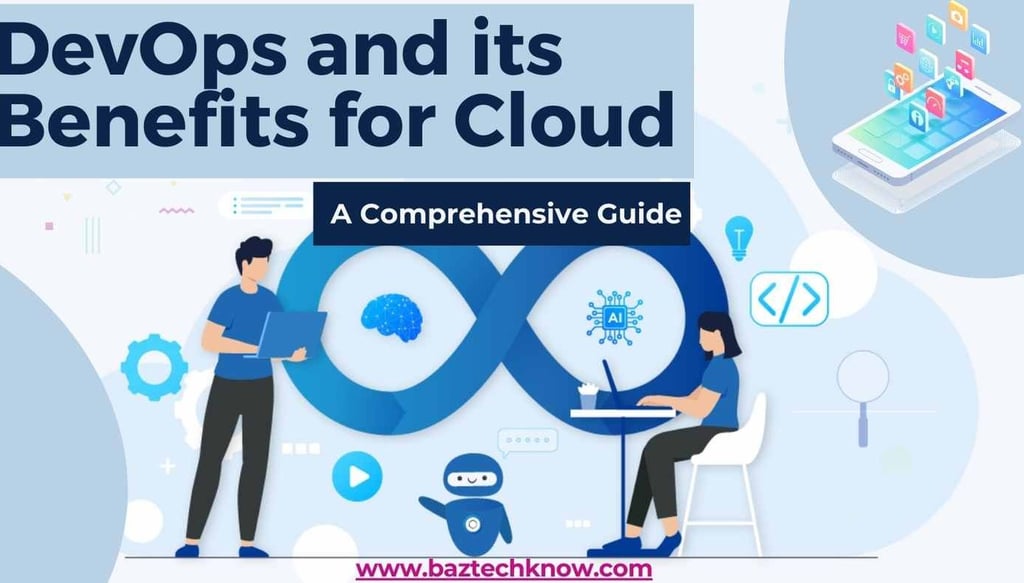50% Doscount for BAZTechKnow Alumni on Upcoming Ansible & Jenkins Course | BAZTechKnow - Your career GROWTH partner!
DevOps and its Benefits for Cloud


Are you working in the IT industry and looking to enhance your skills or switch your career path? If so, then it's worth considering DevOps and cloud training as it can be a game-changer for you. Let's dive into why DevOps training, particularly in the cloud, is essential and how it can directly benefit your professional life.
Innovations in technology cause the IT industry to change at a dizzying rate.Innovations in technology cause the IT industry to change at a dizzying rate. This advancement isn't just bringing exciting possibilities, it's also streamlining processes and improving the lives of developers. Imagine automating repetitive tasks and focusing on creative problem-solving, thanks to intelligent tools.
But even with all of this fast change, one thing stays the same: we need to keep learning and adapting. Embracing new technologies isn't just a trend, it's the key to unlocking your full potential and remaining a valuable asset in the industry.
Why DevOps Training is important for Cloud?
Learn Cloud computing and DevOps to gain hands-on experience with Cloud and DevOps tools commonly used in the job market. You'll manage workloads across servers, orchestrate applications with Kubernetes clusters, and explore the intricacies of cloud networking. Experiment with different cloud service models and train on virtual routers to easily adopt the latest DevOps practices.
To help you understand why devops training is worth your time and money, here's a breakdown of its benefits:
1. Most In-Demand IT skill:
The 2023 DevOps Institute report reveals that 68% of companies are increasing their hiring of DevOps experts. This indicates a rising demand for these professionals in the workforce.
This trend highlights the importance of having skills in DevOps for a successful future. This translates to competitive salaries. According to Glassdoor, DevOps engineers in the U.S. earn an average base salary of $119,000.


2. Bridging the Gap for Increased Efficiency:
Traditionally, development and operations operated in silos, leading to inefficiencies. DevOps training bridges this gap, fostering collaboration and communication between teams. A 2022 study by McKinsey & Company found that high-performing DevOps teams achieve 50% faster lead times for new releases, highlighting the increased efficiency gained.
DevOps emphasizes on sharing, quick feedback, and efficient problem-solving within teams. This creates a vibrant, dynamic work environment where everyone learns from one another.
3. Mastering Tools for Streamlined Processes:
DevOps training equips you with essential tools and methodologies, automating manual tasks and optimizing workflows. According to a 2022 DevOps Trends Report by Atlassian, 94% of organizations leverage automation as part of their DevOps practice, freeing up valuable time for more strategic endeavors.
4. Career Advancement with Enhanced Visibility:
By understanding both development and operations, you become a valuable asset across teams. This expanded knowledge base, combined with expertise in automation and cloud technologies, positions you for leadership roles within your organization.
5. Future-Proofing Your Career Path:
The IT landscape is dynamic, and DevOps continues to be at the forefront of innovation. Acquiring these skills ensures you remain relevant and adaptable, preparing you for future technological advancements and job market shifts


CORE ELEMENTS OF A DEVOPS TRAINING :
A strong DevOps culture thrives on version control, continuous integration, and continuous delivery (CI/CD). These are of utmost importance to a DevOps team’s capabilities.
Version control prevents errors in the project, while CI/CD helps with a consistent 'build-test-deploy' process. Continuous Deployment takes this a step further by making every change to your codebase production-ready. Here is a breakdown of few key areas you'll get familiar with, which are central to thriving in a DevOps role:
Version Control:
Think of it as a digital time machine for your projects, allowing you to track and manage changes efficiently.
Software Delivery:
You need to smoothly and swiftly transfer your code from your computer to where it can be used.
Continuous Practices:
CI, CD, and Continuous Deployment ensure your software is always prepared, updated, and free of errors for deployment.
Multi-Cloud:
Using multiple cloud services increases your choices and backup options, ensuring that your services are always accessible and operational..
Learning by Doing:
The DevOps culture is all about learning by doing. You'll get to build, test, and deploy software in real or simulated production environments. This hands-on approach ensures that when the learning is over, the doing has already begun.


THE REAL-WORLD EMBRACE OF DEVOPS AND CLOUD:
To further fortify our understanding of DevOps in the cloud's impact, let's see some real-world applications.
Case Study 1: E-commerce
An e-commerce company facing regular software delivery challenges implemented DevOps and witnessed dramatic improvements. Faster and more frequent software releases, minimal downtime, and a reduced time-to-market for new features and enhancements. In essence, DevOps provided a comprehensive framework enabling a systematic, quick, and reliable system for ensuring software readiness and delivery.
Case Study 2: Large Enterprise Transformations
DevOps has also proven successful in large enterprises. As explored in a series of fascinating case studies, DevOps transformed software delivery and collaboration across numerous industries, significantly improving IT performance and productivity. This has led to exceptional operational efficiency, better software quality, and enhanced alignment between development and operations teams.
Case Study 3: Continuous Integration (CI)
Another compelling example is the application of Continuous Integration (CI) as part of DevOps practices. CI is a DevOps practice that requires developers to regularly merge their code changes into a central repository.
After that, we run automated builds and tests. This leads to early detection of potential defects, reducing the chances of a last-minute surprise. The cross-industry application of CI has brought efficiency, reliability, and agility to projects.
Case Study 4: DevOps Adoption Model
A case study successfully showed the implementation of a plan for using DevOps in real life. This strategy led to cost reduction in software lifecycle, improvement in operational efficacy, overall efficiency, and better quality of software products
These cases underline that DevOps isn't just a buzzword; it's a real-world solution engendering visible, tangible business outcomes. Indeed, integrating DevOps practices in cloud environments has become an operational necessity, with myriad organizations reaping the benefits, as evidenced by these case studies.
YOUR TAKEAWAY
Investing in DevOps training is not just a career move, it's a strategic step towards future-proofing your professional success. With factual evidence supporting its benefits, it's clear that DevOps training is more than just hype; it's a gateway to unlocking a promising and rewarding career path.
Learning in the cloud with DevOps is more than an educational journey—it's a strategic career move. Ready to leap? Join the most engaging and current DevOps course or Register for BAZTechKnow’s Boot camp If you are still unsure about it then all of your confusion will be cleared.

bazknowledge@gmail.com
Social media
Subscribe to our newsletter
0092-300-8-56-3209
Copyright (c),2025, BAZTechKnow All rights reserved.
BAZTechKnow
Your career GROWTH partner!
OneStop solution for all of your technical needs, from solution designing & implementation to Training / Consultation for ICT, Cloud, Kubernetes & DevOps
